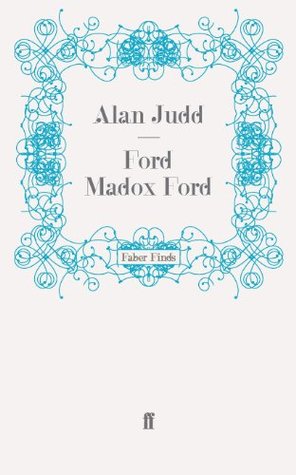One of the many vices I cultivate is a weakness for biographies. An intelligent female once told me firmly that she didn’t read biographies. She thought them depressing: the subjects got old and died. I tried to indicate that she was missing a lot, but she was adamant. I think now that if I were to renew my commendation of the pleasures of biography, I would point to Alan Judd’s new life of Ford Madox Ford as perhaps an ideal place to start. Judd’s book on Ford is a remarkable work about a remarkable man.
For me, Judd’s book anticipated the remark another educated female let out in my hearing the other day: No, she had never read Ford because of his misrepresentations of his relationship with Joseph Conrad. Hers is a typical mistake. Ford was continually misconstrued during his lifetime, and the misunderstandings have outlived the man. Judd’s life of Ford rectifies a host of errors and dissolves various prejudices. There can be no question that the reexamination of Ford’s career and relationships with many literary people is justified, though it has been done before. Indeed, that is what provoked Judd’s book: several times he feels obliged to correct the logic or the judgment of Arthur Mizener, for example.
On the other hand, Judd’s Ford Madox Ford cannot be said to constitute or initiate a Ford revival if only because the best of Ford’s work—The Fifth Queen, The Good Soldier, the first three-fourths of the Teitjens tetralogy known collectively as Parade’s End—never really disappeared from literary awareness. I can myself remember hearing about Ford from my parents and others in the 1950’s, when the cream of his work was reprinted. Ford has been rediscovered again and again. Perhaps these rediscoveries have been necessary because he did not fit easily into categories, and because his life was, in some sense, a shambles. But Alan Judd has found a way to make that life cohere by focusing on Ford’s elusive personality and demonstrating his benignant nature.
Ford Hermann Hueffer was born in 1873 in Surrey, and died under the name we know him by in Deauville, in 1939. A grandson of Ford Madox Brown, he was brought up in a family connected with the Garnetts and the Rossettis; he was early touched by Catholicism, Francophilia, and a reverence for art. His lifelong obsession with writing—he wrote over eighty books and four hundred articles—registered early. By the turn of the century Ford’s relationships with Joseph Conrad, Henry James, and Stephen Crane put him in the middle of the creation of much of modern literature: impressionism and symbolism in fiction, and, later, free verse. As a genuine Bohemian, Ford was never to surrender his indispensable position, which was a mental point d’appui, never a platform for leveraging power. I think Judd makes clear just how a man who doesn’t calculate everything according to advantages of power and money is forever misinterpreted by those who do. And I think too that Judd has shown how a man who was no womanizer was so often beloved of women, not all of whom understood the complexity of his personality.
Out of the Romney marshes. Ford had a second life in London as he midwifed the birth of literary modernism. His English Review was for a time the greatest literary magazine in the world, introducing to the public D.H. Lawrence and Wyndham Lewis. When Ford was exasperated by a poetical gaffe of Ezra Pound’s, he rolled on the floor, saving Pound “years.” It was he who told Pound that poetry should be at least as well written as prose.
After those days and his involvements with Vorticism and Imagism, Ford concentrated everything he knew about the writing of novels in The Good Soldier (1915), his tour de force, and joined the army. His patriotic services told on his health, while his artistic and personal inferiors continued to live in ease in Bloomsbury. Yet his war experience did provide some of the material and provocation for Parade’s End, in which “the last gentleman” endures the collapse of the old culture into the new world of industrial power.
Ford kept on as he had done before: he wrote, he edited, he encouraged and taught the young, he was loved, he loved life’s finer pleasures. In his later years, his influence was amplified by his years in America. Judd doesn’t emphasize the point, but through Caroline Gordon and Allen Tate—through their novels as well as their teaching—Ford’s influence was broadcast in this country and shows up in the work of their students. Never provincial, Ford had an international, cross-cultural, and transatlantic impact. ,/p>
Above all, his impact was personal, and Alan Judd has written a personal, even Fordian, book about him. Judd’s biography often relies on a sort of privileged intuition and is bracingly unacademic though bristlingly intelligent. I suppose Judd identifies with his subject—one man of letters understanding another—and that is as it should be. The result is a sympathetic or empathetic study that’s untethered by ordinary concern for documentation. Judd has made his own rules and justified them, oddly subordinating sometimes the presentation of Ford’s life to his comment on it. Reading Judd’s Ford Madox Ford is an offbeat but rewarding, even moving experience that uncannily captures the “something else, something left over”—the spirit, the sense of life itself— that is generally evaporated from ordinary biographies.
[Ford Madox Ford, by Alan Judd (Cambridge: Harvard University Press) 476 pp., $27.50]

Leave a Reply